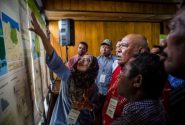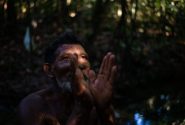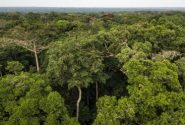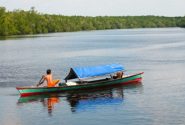By Angela Dewan
“Whether REDD will be effective is the hottest question in the forest and climate change arenas right now,” CIFOR Director General Frances Seymour told a press conference today at a forestry conference in Seoul. “Some say it could be disastrous, while others think it has great potential.”
Whether or not the REDD scheme – which essentially involves developed countries paying developing countries to protect their forests – can save the day and effectively mitigate climate change, the fact of the matter is there’s little time left to keep discussing it.
“Over a quarter century, we probably spent the equivalent of a few years just debating terminology,” Seymour said, delivering the keynote address today at the International Union of Forest Research Organizations’ World Congress.
“We continue to discuss what is a community and what is a forest longer than is necessary to agree on terms and move on.”
Seymour’s energetic address was like a half-time pep talk for scientists. She implored the science community to undertake “big science” to form global collaborations with ambitious targets.
“Since no single organization has the capacity to do big science alone, it requires subsuming our narrow organizational agendas to a collective effort.”
She said experts in forestry and climate change could learn from their colleagues in medicine by conducting more rigorous impact assessments.
“Many of you might have seen the article in the New York Times earlier this month describing how agreement on common methods and data-sharing among Alzheimers researchers had dramatically accelerated progress in understanding that disease,” she said.
“It’s time to up our game. We will need to have robust answers to the question ‘What works?’ in more like five years rather than 25.”
Not only does the science community need to collaborate, it needs to do it fast. Experts say that the world’s primary rainforests will be lost in 40 years if no action to protect them is taken.
Decision-makers are waiting for the conclusive science on the benefits of REDD, but research cannot always be fast-tracked. Even when efforts are accelerated, there are still constraints.
“The research community is under enormous pressure to have something useful to say about all this in impossibly short time frames, driven by negotiation schedules and funding cycles,” Seymour said.
Realistically, research and practice are going to have to occur simultaneously, Seymour said.
”Rather than wait for case study material to accumulate, we can proactively work with policy makers and project designers to build in, from the beginning, features of REDD and adaptation interventions that will facilitate impact assessment later on.”
We want you to share Forests News content, which is licensed under Creative Commons Attribution-NonCommercial-ShareAlike 4.0 International (CC BY-NC-SA 4.0). This means you are free to redistribute our material for non-commercial purposes. All we ask is that you give Forests News appropriate credit and link to the original Forests News content, indicate if changes were made, and distribute your contributions under the same Creative Commons license. You must notify Forests News if you repost, reprint or reuse our materials by contacting forestsnews@cifor-icraf.org.













